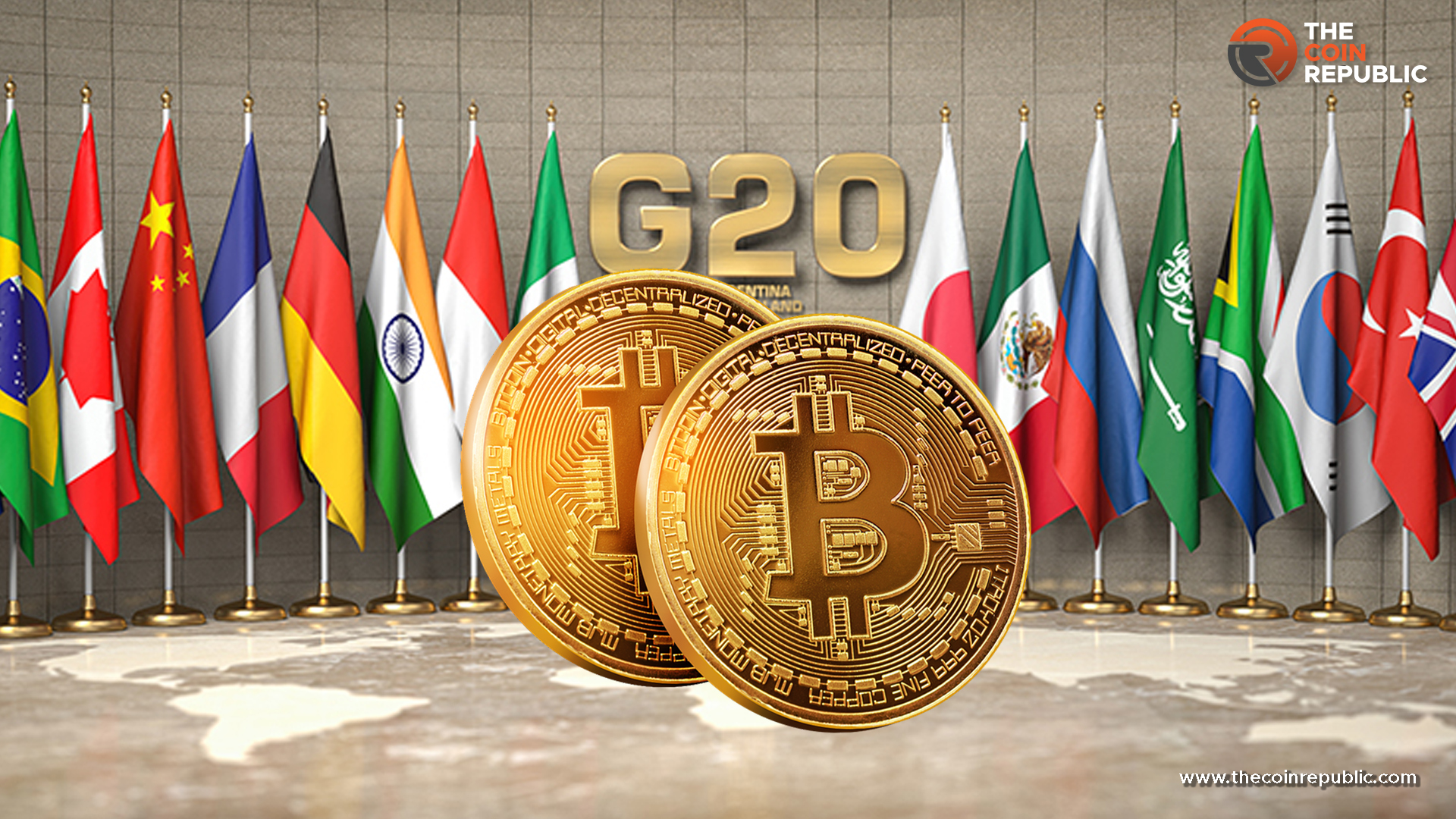
- Indian PM Narendra Modi, as G20 president, has urged global cryptocurrency rules for borderless tech
- He likens cryptocurrency regulation to aviation standards, emphasizing the need for global consistency
- This comes when India’s own crypto regulations are complex, with high taxes driving firms away
Indian Prime Minister (PM) Narendra Modi, in his role as president of the Group of 20 (G20), has urged for international collaboration in Cryptocurrency Regulation. The G20, which consists of 19 countries and the European Union, represents major global economies and plays a pivotal role in international economic cooperation. Modi emphasized the need for a comprehensive global framework to govern cryptocurrencies during the annual G20 summit.
In an interview with a local publication, Modi highlighted the significance of emerging technologies like blockchain and cryptocurrencies, asserting that their impact transcends national borders. Furthermore, he argued that the regulations and framework governing these technologies should not be the sole domain of a single nation or a select group of countries. Drawing a parallel with the aviation industry, Modi likened the need for global cryptocurrency regulations to the common rules and regulations that oversee air traffic control and air security. He also underlined India’s active involvement in the global conversation surrounding cryptocurrency regulation.
READ: Nigeria cryptocurrency exchange Patricia attracts massive scrutiny
Under India’s G20 presidency, the country has expanded discussions on cryptocurrencies, moving beyond considerations of financial stability to encompass broader macroeconomic implications, particularly for emerging markets and developing economies. India’s leadership has facilitated seminars and dialogues that have deepened understanding of crypto assets.
On August 1st, India released a presidency note outlining its input on the global cryptocurrency framework. These suggestions align with guidelines established by the Financial Stability Board, the Financial Action Task Force, and the International Monetary Fund. Additionally, the note includes recommendations that specifically address the needs of developing economies.
However, India’s advocacy for a global cryptocurrency framework comes despite its own complex and uncertain regulatory environment for cryptocurrencies, which includes high taxation. In 2022, India imposed a 30% tax on cryptocurrency gains, a move that prompted numerous cryptocurrency companies to leave the country and resulted in a significant decline in crypto trading activity.
READ: How to acquire citizenship and land ownership in the CAR through cryptocurrency
The call for international cooperation in cryptocurrency regulation by Prime Minister Modi underscores the recognition of cryptocurrencies as a global phenomenon that individual countries cannot effectively regulate. Moreover, it acknowledges that the impact of cryptocurrencies extends beyond national borders, affecting economies, financial systems, and consumers worldwide. By advocating for a comprehensive global framework, India seeks to foster a more stable and secure environment for cryptocurrencies that promotes innovation and safeguards the interests of investors and nations.
The Group of 20, or G20, holds a unique position in global governance, representing a diverse group of economies ranging from the world’s largest to emerging markets. It serves as a forum for discussions and policy coordination on international economic matters, covering a wide range of topics, from trade and finance to technology and sustainability. The G20’s role in shaping global economic governance has become increasingly significant in a world characterized by interconnectedness and interdependence.
Narendra Modi’s leadership as president of the G20 provides India with a platform to influence and shape the global discourse on critical issues such as cryptocurrency regulation. By advocating for collaborative efforts in regulating cryptocurrencies, Modi recognizes the need for a unified approach to address the challenges and opportunities presented by this emerging asset class.
READ: Impact of cryptocurrency economies and financial landscape
Modi’s comparison of cryptocurrency regulation to the aviation industry’s common rules and regulations is a compelling analogy. Just as air traffic control and air security require international standards to ensure safe and efficient global travel, cryptocurrencies, which operate across borders, demand a unified regulatory framework to prevent misuse, fraud, and illicit activities. This perspective aligns with the increasingly global nature of cryptocurrencies and their potential impact on the financial landscape.
India’s release of a presidential note on cryptocurrency regulation reflects the country’s commitment to fostering a secure and stable environment for digital assets. Moreover, by aligning its suggestions with established international bodies such as the Financial Stability Board and the Financial Action Task Force, India demonstrates its willingness to work within established global frameworks while also addressing the unique challenges developing economies face.
However, it’s essential to acknowledge the complexities within India’s own regulatory environment for cryptocurrencies. The imposition of a 30% tax on crypto gains in 2022 led to an exodus of crypto companies from the country and a subsequent decline in trading activity. This tax policy exemplifies the challenges faced by governments in balancing the need for revenue generation with the promotion of innovation in the cryptocurrency sector.
ALSO READ: Namibia signs into law cryptocurrency exchange regulation bill
In conclusion, Prime Minister Narendra Modi’s call for global collaboration in cryptocurrency regulation highlights the growing recognition of cryptocurrencies as a global phenomenon with far-reaching implications. The G20, as a forum for major economies, is an appropriate platform for discussing and coordinating efforts to address the challenges and opportunities presented by digital assets. India’s active involvement in shaping the global cryptocurrency regulatory framework reflects its commitment to fostering a secure and innovative environment for this burgeoning technology, even as it grapples with its own domestic regulatory complexities. Ultimately, international cooperation in cryptocurrency regulation is essential to ensure the responsible development of this transformative technology on a global scale.
- SEO Powered Content & PR Distribution. Get Amplified Today.
- PlatoData.Network Vertical Generative Ai. Empower Yourself. Access Here.
- PlatoAiStream. Web3 Intelligence. Knowledge Amplified. Access Here.
- PlatoESG. Automotive / EVs, Carbon, CleanTech, Energy, Environment, Solar, Waste Management. Access Here.
- PlatoHealth. Biotech and Clinical Trials Intelligence. Access Here.
- ChartPrime. Elevate your Trading Game with ChartPrime. Access Here.
- BlockOffsets. Modernizing Environmental Offset Ownership. Access Here.
- Source: https://web3africa.news/2023/09/01/news/inidan-pm-modi-calls-for-cryptocurrency-regulation-at-g20-summit/
- :has
- :is
- :not
- 19
- 1st
- 20
- 2022
- a
- acknowledge
- acquire
- across
- Action
- active
- activities
- activity
- Additionally
- address
- addressing
- advocacy
- advocating
- affecting
- AIR
- align
- aligning
- Aligns
- also
- an
- and
- annual
- approach
- appropriate
- ARE
- argued
- AS
- Asserting
- asset
- asset class
- Assets
- At
- Attracts
- AUGUST
- aviation
- balancing
- BE
- become
- Beyond
- blockchain
- board
- bodies
- borderless
- borders
- broader
- burgeoning
- by
- call
- Calls
- cannot
- car
- challenges
- characterized
- class
- collaboration
- collaborative
- comes
- commitment
- Common
- Companies
- comparison
- compelling
- complex
- complexities
- comprehensive
- conclusion
- considerations
- consists
- Consumers
- control
- Conversation
- cooperation
- coordinating
- coordination
- countries
- country
- country’s
- covering
- critical
- crypto
- crypto companies
- Crypto regulations
- crypto trading
- crypto-assets
- cryptocurrencies
- cryptocurrency
- Cryptocurrency Exchange
- cryptocurrency regulation
- Cryptocurrency Regulations
- Decline
- Demand
- demonstrates
- Despite
- developing
- Development
- digital
- Digital Assets
- discourse
- discussing
- discussions
- diverse
- domain
- Domestic
- drawing
- driving
- during
- Economic
- economies
- effectively
- efficient
- efforts
- emerging
- emerging markets
- emerging technologies
- emphasized
- emphasizing
- encompass
- ensure
- Environment
- essential
- established
- European
- european union
- Even
- exchange
- exemplifies
- Exodus
- expanded
- extends
- Face
- faced
- facilitated
- far-reaching
- finance
- financial
- financial action task force
- financial stability
- Financial Stability Board
- financial systems
- firms
- For
- Force
- Forum
- Foster
- fostering
- Framework
- frameworks
- fraud
- from
- fund
- Furthermore
- G20
- Gains
- generation
- Global
- Global Economic
- global scale
- governance
- governing
- Governments
- Group
- Growing
- guidelines
- Have
- he
- High
- Highlighted
- highlights
- his
- holds
- HTTPS
- illicit
- Impact
- implications
- imposed
- in
- includes
- increasingly
- india
- Indian
- individual
- industry
- industry’s
- influence
- Innovation
- innovative
- input
- interests
- International
- international monetary fund
- Interview
- into
- Investors
- involvement
- issues
- IT
- ITS
- jpg
- just
- Land
- landscape
- largest
- Law
- Leadership
- Leave
- Led
- like
- local
- Macroeconomic
- major
- Markets
- massive
- Matters
- misuse
- Monetary
- more
- Moreover
- move
- moving
- nation
- National
- Nations
- Nature
- Need
- needs
- numerous
- of
- on
- operate
- opportunities
- or
- oversee
- own
- ownership
- Parallel
- particularly
- perspective
- phenomenon
- pivotal
- platform
- plato
- Plato Data Intelligence
- PlatoData
- plays
- policy
- position
- potential
- presented
- presidency
- president
- presidential
- prevent
- Prime
- prime minister
- promotes
- promotion
- provides
- Publication
- range
- ranging
- Read
- recognition
- recognizes
- recommendations
- reflects
- Regulate
- regulating
- Regulation
- regulations
- regulatory
- release
- released
- representing
- represents
- require
- responsible
- revenue
- Role
- rules
- safe
- safeguards
- Scale
- sector
- secure
- security
- Seeks
- serves
- Shape
- shaping
- should
- significance
- significant
- Signs
- single
- specifically
- Stability
- stable
- standards
- subsequent
- such
- Summit
- Surrounding
- Sustainability
- Systems
- Task
- task force
- tax
- Taxation
- Taxes
- Technologies
- Technology
- that
- The
- their
- These
- this
- Through
- to
- Topics
- trade
- Trading
- traffic
- transcends
- transformative
- travel
- Ultimately
- Uncertain
- underlined
- underscores
- understanding
- unified
- union
- unique
- when
- which
- while
- wide
- Wide range
- Willingness
- with
- within
- Work
- world
- world’s
- worldwide
- zephyrnet













